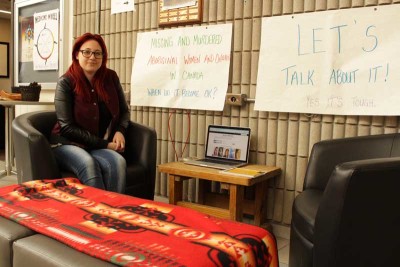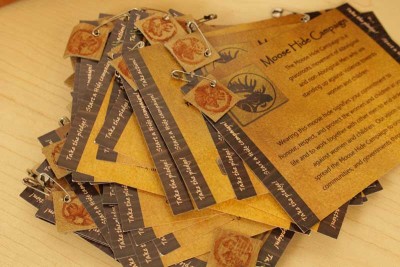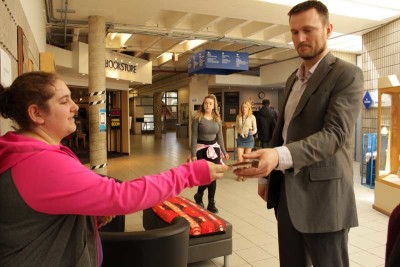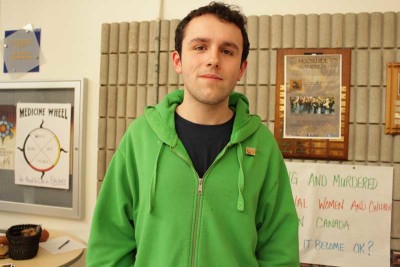Story and photography by Mehreen Shahid
A Métis Textiles student believes it’s time men join the fight to end violence against women and children.
Kayla Parisien, 19, last week brought the B.C.-based Moose Hide Campaign to Sheridan’s B-Wing. Accompanied by colleagues, she distributed moose hide pins stamped with the campaign’s logo to men passing by.

“As a child from a background of domestic violence, I think it’s important to have men take a stand,” she said.
Parisien has spent the past decade mending her relationship with her father, which was damaged by years of physical and emotional abuse.
“As an outspoken little girl, I talked a lot about it,” she explains. “And my Grade 3 teacher was able to help us figure out how to limit his visitation rights, because my mom was at the end of her rope.”
Her friend Stacey Bluestein, a second-year Child and Youth Worker student, understands exactly why this campaign matters to Parisien.
“I was abused by my partner for three years,” said the 26-year-old. “For the longest time, I denied it, because it wasn’t physical abuse. But it was emotional and psychological.”
According to Bluestein, when her partner called her “bitch,” “idiot” or “stupid,” she believed every word of it. She never discussed her situation with friends or family.
“He made me feel I was doing something wrong,” she said.
In 2012, her partner went away for a weekend, but didn’t return. When she went to the bank to pay rent for the month, she discovered her accounts had been cleared. A little investigative work on her part revealed that he had withdrawn all the money from their joint business and personal accounts and was at a casino gambling it all away – with another woman.
“As soon as I got confirmation from friends, who work at the casino, I decided: That’s it. And I packed up my stuff and walked away.”
MORE RELATED TO THIS:
-
Sheridan students help build school for aboriginal community
-
Oakville pays tribute to missing or murdered aboriginal women
Aboriginal women are three times more likely to be subject to domestic abuse compared to non-aboriginal women.
According to a 2010 report by Native Women’s Association of Canada, 54 per cent of aboriginal women reported severe forms of family violence, including being beaten, choked, having had a gun or knife used against them or being sexually assaulted, as opposed to 37 per cent of non-aboriginal women.
“It’s not a topic people want to talk about,” said Paula Laing, a student success and transition advisor at Sheridan’s Aboriginal Initiatives. “It’s hard to get people to stop and find out the facts. It is challenging to get a response, but people have been willing to participate.”
In the first hour of the four-hour long campaign, Parisien and Bluestein were able to stop 15 men who pledged their support for the campaign.
Ryan Piper, senior manager of labour relations and talent acquisition at Sheridan, said men could improve the situation, not merely in their own behaviour, but by contributing “to situations by speaking up when they see women and children being mistreated.”
Domenic Spina, a second-year Social Service Worker student, said abuse is wrong in any form and hitting a woman is one of the worst things a man could do.
“We could advocate for everyone, speak up and educate everyone,” he added. “Domestic abuse perpetrators get short sentences, they should have longer sentences.”
This campaign serves as a small step toward educating the wider masses about the abuse of women and children. But for the victims of the abuse, there is a long way to go.
“It’s really hard getting back on good terms with my dad,” said Parisien, “probably because I was witness to more abuse than my younger siblings.”



